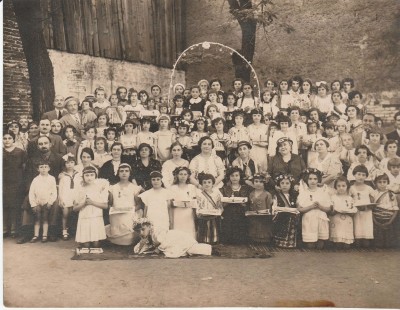March 21, 2016
By Andreea Grecu
The generation who lives
What are cultural policies good for, anyway? What makes us feel so good about ourselves when we say we have and use such tools? Are we happier, more relaxed, are we different in any way when walking down the street? And overall, what is the secret to this concept?
There are many possible approaches, from scientific explanations that prove, using numbers, pie charts and other excellent illustrations, why it’s useful to apply to public policy, to campaigns for promoting urban regeneration and other such causes that use the idea of rebuilding, community, aesthetics, etc.

Before holidays in a free world. Normality and simplicity. The crush of non-value awaits in the shadows. Source: private collection.
But hélas, as the French would say, what is Romanian is Romanian all the way. A tool such as cultural policies could work as a shield against a pack of young wolves who would fight for new furniture and acquiring skills for serving coffee on a tray with identical coasters and napkins, but nowadays, in 2016, it could be used to fight against the young political wolves who made it into culture and demand more “impressive” fences (the current ones aren’t up to par anymore) around the A listed historical monuments, patrimony monuments of national importance.

International Symposium dedicated to the commemoration of 140 years since the 1848 Revolution, Romanian Athenaeum, June 18, 1988, from left to right: Ștefan Ștefănescu, ?, Miu Dobrescu (president of General Federation of Unions in Romania), Constantin Olteanu (Mayor of Bucharest, secretary of the Romanian Communist Party’s Central Committee), Manea Mănescu, ?, Ion Stoian (secretary of the Romanian Communist Party’s Central Committee), Ilie Ceaușescu. A time still too close to us. Source: private collection.
Such a tool would go hand in hand with a specially organized National Anti-corruption Directive to handle cultural issues and clean up the double, triple, quadruple conflicts that are everywhere. But we’ll leave the spring cleaning plans to someone else. Let’s get back to the cultural plans.
Who do we expect to reform the institutions and the cultural system? To be honest, I don’t think we should even be considering the idea of a reform. But assuming that we wouldn’t be able to sleep at night thinking of the new wave of artists and creators who are about to break down the doors for a chance to create and to shape a new cultural world, here’s what I’m suggesting (and you can’t get out of this one): we have researchers, actors, dancers, choreographers, directors, visual artists, performers, and countless other vocational graduates. Every university in the Wallachia, Moldova, Transylvania, Dobrogea, Banat releases into the so-called competitive market people with very specialized diplomas, from art historians to pure-blooded practitioners. Moreover, it will also release future specialists in cultural heritage, once patrimony studies leave the legal sphere and become a part of the academic realm.
- What are we going to do with them and for them? For the time being, they are preparing themselves for their master’s degrees and other forms of escape with supersonic speed towards less precarious horizons. Yet some chose to stay here. Well, now would be the time for the ancient choir to swoop in and explain to us how the new generation is going to save us using a creative catharsis.
Is that so?
Each morning I set out to absorb managerial and formative forces, positive energies and the will to work. But once I pass the threshold of my desk job and I enter a different universe, a parallel world that welcomes me with a well-positioned brick right over the start of my day, a good start, but completely blocked by the aforementioned brick.

Diploma project, The Institute: DIPLOMA of creative specialties graduates under the scrutiny of Bucharest audience; source: http://www.iqads.ro/articol/33433/diploma-absolventilor-facultatilor-creative-sub-privirile-bucurestenilor
Sometimes, all it takes is reading my social media messages, turning on the TV to the news channel to seriously ask myself what am I doing in the otherworldly cultural landscape of Romania? When I’ll figure that out, I’ll let you know.
2. For the time being, what keeps me going is the burning desire and the strong faith of a young girl to rebuilt a community somewhere in the Romanian north-west, where university graduates come to start their own business and start a family. Which translates into living, despite the public policies meant to aid them in their struggle.
Which, to me, is something powerful enough to keep me going in my pessimistic enthusiasm. Is there such a feeling? I feel like it’s taking over me every time I witness the effects of our cultural policies over the past 25 years. And I don’t intend to stop analyzing that which cannot be analyzed, nor do I ever want to stop reflecting on what was, on what was lost and on what will never happen in my home country.
So that leaves us to either, 1. run, last man standing must close up shop, or 2. we stay here and fight. But who will chose to stay? Who and what are we up against and the resources are here/somewhere else and we (don’t) have access to them.
You get to answer that for yourself. I’ve been mulling it over for 18 years now and I got nothing.
POSTED BY
Andreea Grecu
Andreea Grecu is a cultural manager and lecturer. Between 1999-2004, then from 2009 onward, she is active on the NGO scene, as member of cultural associations and professional unions in domanis such a...

